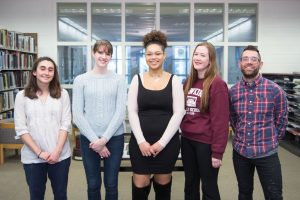Fall is here and so are the Incubator Awards! If you haven’t heard, the Incubator Awards are an annual library program which provides student artists at all levels with funding to explore research questions and produce creative projects using any of our special collections. Each participant’s work culminates in a project which can take any form, including but not limited to film, visual art, artist books, writing, music, and performance. This paid opportunity gives students from all artistic disciplines the chance to work intimately with library materials that spark their creativity and produce something they can share with the UNC community at the Incubator Showcase.
We asked some former Incubator Award recipients to tell us about their experience in the program and offer advice to potential participants. Read their responses below to get inspired for your own Incubator project and learn more about what our special collections have to offer.

Joel Hopler, 2017-18 recipient
At the time of the Incubator Awards, Joel was in his last year of earning an MFA in Studio Art. His work at Wilson Library supported his Master’s thesis show. He has since graduated from the University of North Carolina at Chapel Hill.
Joel’s project
My research moving into getting the Incubator Award was to focus on a cross-historical, cross-cultural, collaborative environment between etchings from like 17th, 18th century Europe, Edo Japanese ink wash drawings, and then tying it into post-abstract expressionist art. At the time I was looking for sort of like metaphors of contemporary American fatherhood.
Which libraries did Joel use?
Definitely the Wilson Rare Book Collection. We looked into the cage at the Sloane Art library at some Jackson Pollock facsimiles… the Sloane Art library a lot. And I interacted actually a good bit with the Ackland.
Joel’s advice to potential applicants
I think the more you talk to people, the quicker you figure things out. And so, while it is, like, very important to understand how the digital catalogs work and how to search and find things, asking human beings questions is exponentially faster so the more I got to talk to people and meet with them in person, I think the faster my research started going in a productive direction.
Emily Yue, 2017-18 recipient
At the time of her award, Emily was a senior double majoring in Studio Art and Media & Journalism. She has since graduated from the University of North Carolina at Chapel Hill.
Emily’s project
So what began as my capstone project for my Photojournalism major was the “Queer Bodies, Tender Hearts” series of portrait photography that I was doing of queer people of color and queer activists in the South. What I ended up doing was sort of blending my fine art background with the photography and making a deck of tarot cards and matching these people with the symbolism and iconography of tarot and making a book that accompanies it that sort of explains the cards and includes excerpts from the interviews I did with the subjects who sat.
Which libraries did Emily use?
I read a lot of the artists’ books that were in the Sloane Art Library and the Hanes Art Center.
Emily’s advice to potential applicants
I think no matter what your field or discipline is, it’s worth applying and I’d say to come into it with a lot of open-ended questions. And make sure that whoever you’re working with, if it’s your faculty advisor… I think it’s good to have good personal stuff on top of professional and like scholarly stuff as well. And to not worry so much about having something finished, but about being able to explore something a lot more thoroughly than you have before. It’d be really cool to see like a stem-centered Incubator performance art piece, or more photography, or some film, but it’s very cool. Libraries are great. That’s my advice.
Applications for the 2019-2020 Incubator Awards will be accepted October 1-31, 2019. To learn more about the program or submit your own proposal, click here.
